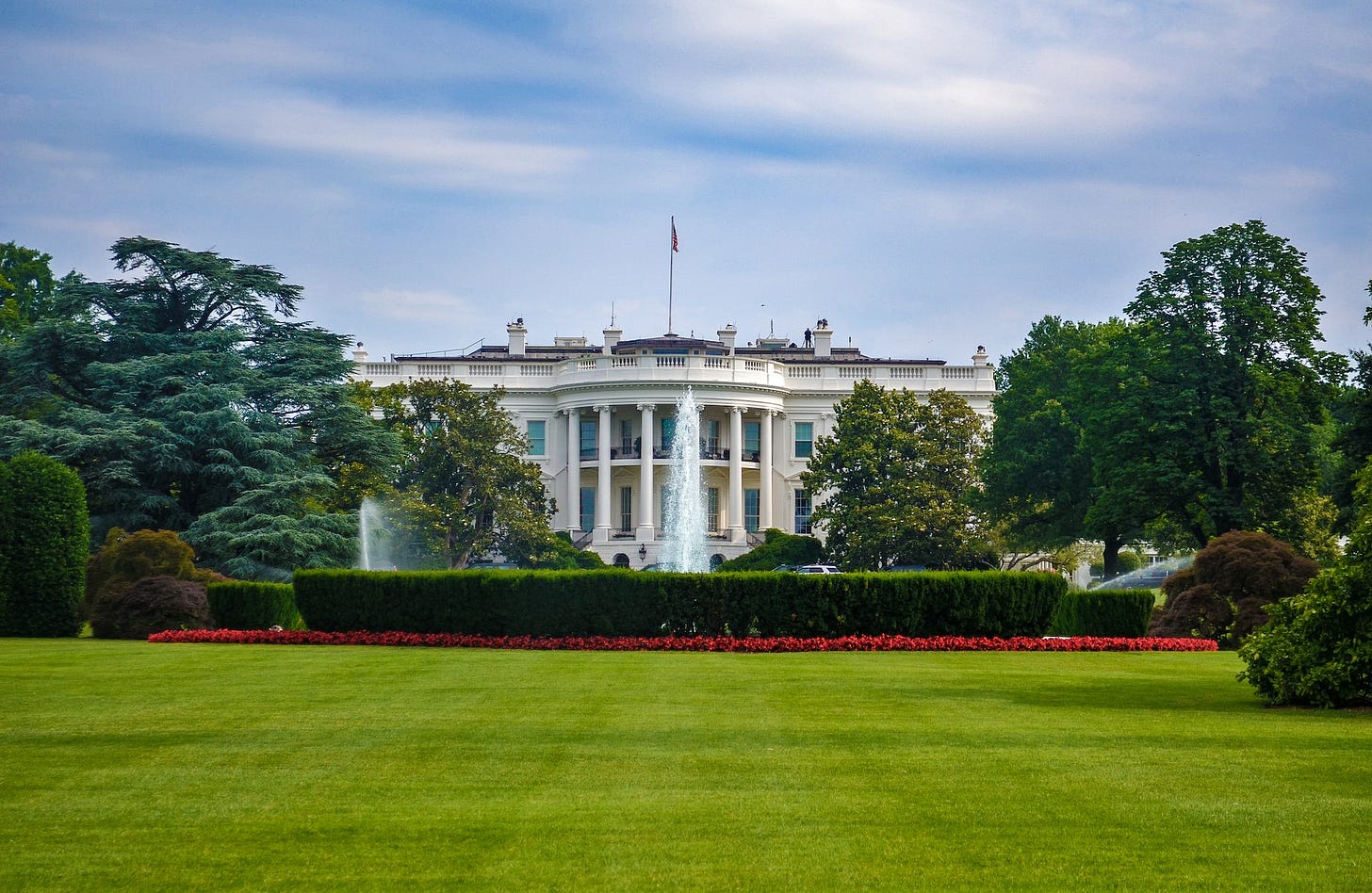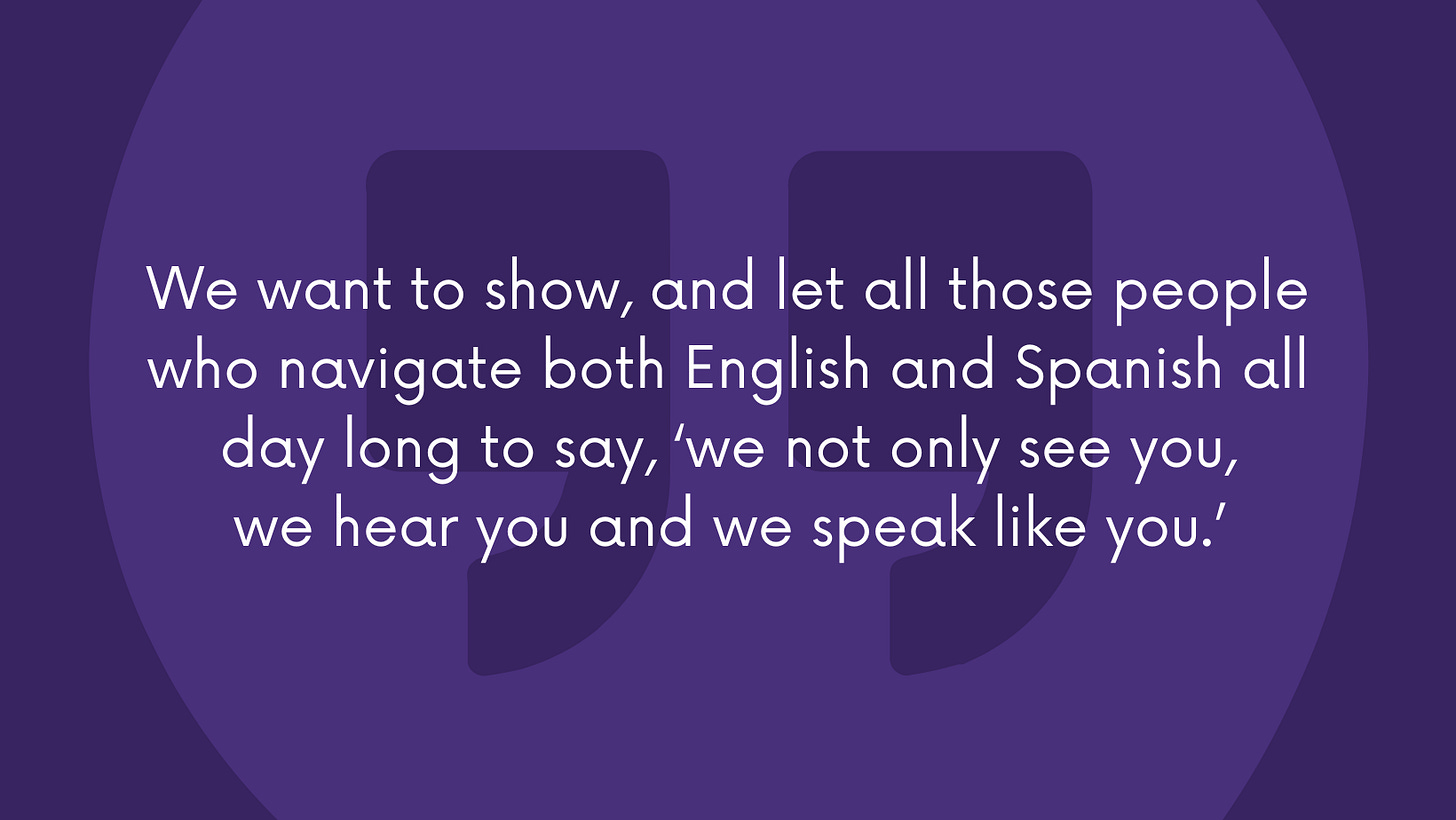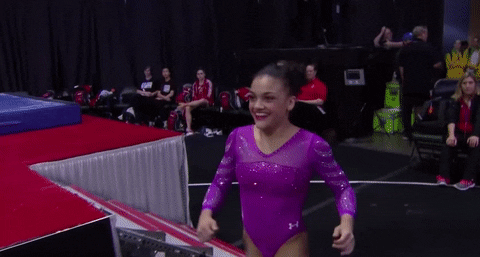State of the Union... bilingue
A. Martinez and Erika Aguilar discuss NPR's first-time bilingual special coverage
This Tuesday, NPR intends to provide live bilingual coverage of the State of the Union address and Republican response for the first time. 🎉🎉🎉
As the United States continues to grow more diverse, it's important for NPR to respond to growing local needs and look to experiment with and offer more Spanish-language news content. This not only allows bilingual audiences to stay informed about the latest news and events, but also helps them connect with their community through public media.
In this special edition of OIGO, I got to speak with A. Martinez and Erika Aguilar about this endeavor. ▶️ We got to dig into why this bilingual news coverage is an important resource for the growing Latino population in the United States. We also reflect on how stations carrying this type of programming enables them to reach a wider audience and provide them with information. 🗞️
“NPR's Live Special Coverage of the State of the Union en español -- un programa bilingüe” will feature President Biden’s speech and the Republican response translated in Spanish. 🔉 Bilingual commentary will be hosted by A Martinez with NPR correspondents Franco Ordonez, Claudia Grisales, Eyder Peralta and Sergio Martinez-Beltran of Member Station KUT.
We might take for granted sometimes that bilingual Spanish-speaking listeners rely on NPR too for trustworthy information about what is happening in the nation and around the world. 🌐 Tuesday’s coverage is expected to be similar to the English-language Special Coverage that NPR provides every year. NPR is offering this bilingual coverage in addition to the usual English-only feed hosted this year by Ari Shaprio.
NPR’s announcement notes, “We hope this additional special coverage option broadens the reach of information you are able to provide your communities. We know that many stations already provide broadcasts, streams, and other content in Spanish, and hope this additional program offering enhances those efforts. We strongly encourage you to carry the bilingual special coverage on one or more of your platforms.” 🤝
Let’s talk about this bold move at NPR with Erika Aguilar and A. Martinez. 👇🏽
Why was this important to you, and how did it happen?
Martinez: Erika approached me with the idea a few weeks ago, but we've been having conversations for months about ways to try on a lot of things that come out from Morning Edition. To experiment and try to figure out a way to do things in Spanish or at least be more bilingual.
I remember when I went to the Tijuana to report on the border. All of our reporting was in English. I spoke to the mayor of Tijuana. That wasn't Spanish, but I thought when we put out our product, which was an all-English product, wouldn't it be awesome if that product could also come out in Spanish. I thought there were a lot of other stories that some of our own producers and contributors have turned in that have to do with people who speak Spanish, but the story is in English. Wouldn't it be great if we could somehow find a way to put that same exact product out in Spanish? It takes people to actually do it because you have got translate and make sure everything's correct. So, I kind of was thinking like ‘well, okay, maybe we'll be able to do it for special occasions.’
I was so glad when Erika called me and said ‘hey, what do you think of this?’ This is absolutely perfect because this is something that most of us do already. Most people who speak Spanish in their homes when they were kids and then when they went out in the world and started speaking English continue to do this as they grow up. They go back and forth between both languages, and sometimes in the middle of a day or the middle of a conversation or the middle of a sentence. We want to show, and let all those people who navigate both English and Spanish all day long to say, ‘we not only see you, we hear you and we speak like you.’ And that's what this product is for. That's who this product is for.
Aguilar: One of my colleagues from All Things Considered is the one who came to me and asked about doing this in Spanish. I was like, ‘I think it can be done.’ But then he kept coming back to me and asking, ‘how would we do it, and who would do it like this.’ But it has been exciting and it's the one thing that has really put a smile on my face in the last few weeks.
It’s a privilege to be able to work with people who look, think and sound similar, or just get you. A., I don't know if you thought this way, but there's something special about what happens in that studio. We've been doing some rehearsals, and it's really special. There’s this magic. The accents you hear, and there's a level of trust. Also, we are doing this para la gente, and so that feels really good and gives you purpose.
Martinez: Oh, yeah! Being in the room with Franco Ordonez and Claudia Grisales, our two correspondents in studio with me in DC next week. It's like talking to a family member -- how you had these conversations about politics and issues and stuff around the dinner table. It's nice to be in that flow with people who are thinking those same things for a long time. It's a different kind of sensibility. We're going to bring up some of the things that maybe aren't mentioned by President Biden, but are important to people who are in that same kind of headspace.
How was the journey from conversations with NPR to making logistics come together on the lead up to Tuesday?
Aguilar: Because it's something that we've not done before, there's a bit of me going like this! (sticks out hands) This is a broadcast, so it’s little things that I had never even thought about. And then the editorial issues like, ‘when do we go in Spanish? And when do we go in English? And is it too much? Is it too little?’ When we did our first rehearsal it was, ‘wow, that was 90 percent in Spanish.’ I didn't realize we were able to do that. Then we did it again and we had a mix of it; and we heard, ‘well, some native Spanish speakers were listening and felt it was weird and confusing.’ It's just so reflective of Latinidad in America that is mixed. We have so many different experiences. I think that was interesting and reflective.
What is the balance in terms of language that you all have decided on or were able to strike?
Martinez: As Erika mentioned, the first rehearsal was majority Spanish with very little going into English. I think we used English as kind of a crutch. Whenever we'd come up with a word that had a pronunciation that we were not sure of or we were struggling with, we would just jump into Spanish on that. For example, I was having trouble with the word ciudadanía so I just said citizenship. We made a point to try and do it where, if I'm speaking or a reporter is speaking in Spanish to end their answer, I would pick it up in Spanish. Then if the reporter is ending their answer in English, I would pick it up in English to try and have a connective thread throughout the broadcast.
We're going to land somewhere in the in-between of those two, depending on who you are and your level of comfort with both languages. If we somehow try to land between that, I think we'll probably hit a better spot than we did in those individual rehearsals.
Who is this directed to?
Martinez: Me. I'm the audience. Erika is the audience. People like us who navigate the day speaking to family and friends in both languages. It’s the way millions of bilingual people – not just English and Spanish – are doing here. That's what the kids of immigrants for decades in America have done, to not only survive, but to connect both sides of who they are.
I grew up with grandparents who never spoke English. I had to navigate that world with them in Spanish and then turn around and speak to my brother in English, because we were more comfortable with English. The audience for this is people like that, who have spent their entire lives having one foot on each side and figuring out the best way to survive the day or even just the conversation that they happen to be in because that's what we're equipped to do. We're equipped to shift back and forth due to the dual sides of our culture.
Any feedback from stations so far about this effort?
Aguilar: I feel like I'm a daughter of public media and, in my career, grew up within public media. I have a very tender heart for member stations. So, of course, when we were thinking about who to bring in, I thought Sergio Martinez-Beltran because he's been on Up First and I'm familiar with KUT because that's where I used to work. I already knew that some stations are offering some type of Spanish-language or bilingual content. And so far the interest has been ‘how do I get this,’ which is exciting.
What does this going successfully look like for you?
Aguilar: Success for me is we walk out of there with something that we are proud of, that we feel is of value to the listeners. I like to say that our job is to fall in love with our audience, so that we can serve them. So, success means that when I make content, I feel very proud because the audience walks away feeling like they got something of value.
We feel confident enough and curious enough, and the audience is excited enough, to think about what's the next one.
Martinez: Success for me is for NPR listeners of all backgrounds to hear this and be proud that it's an NPR product. In other words, being able to say, ‘hey, this is why I give to NPR. This is the exact reason why I'm proud to be an NPR listener. This is an NPR product.’ It holds the standard of what they expect out of what an NPR product is. For the people that maybe have never listened, maybe they hear about it from someone and they tune in and they become NPR listeners and then become contributors and see NPR as a place that not only sees people, but also gives them a voice. 🟢
If your station is interested in or intends to carry “NPR's Live Special Coverage of the State of the Union en español -- un programa bilingüe,” please let NPR know by contacting programservices@npr.org. The program will be available via ContentDepot for subscription. Stations’ participation and feedback will be immensely helpful in the planning for future similar initiatives.
La próxima ⌛
The next OIGO is in your inbox February 17. I promised a second part to the conversation on diverse recruitment and retention in public media. That got delayed due to this major breaking story with Erika and A. It’s ready! Your thoughts on the topic beforehand are welcome.
I am always on the search for great efforts, people to highlight, and interesting news. Reach out anytime to let me know.
-- Ernesto
Cafecito: stories to discuss ☕
St. Louis Public Radio has wrapped its first season of We Live Here, Auténtico!, a collaboration with the local Hispanic Chamber of Commerce. 🕪
Connecticut’s Record-Journal will expand its Latino Communities Reporting Lab, thanks to a grant from the John S. and James L. Knight Foundation; as will Enlace Latino NC, thanks to an American Journalism Project gift. 💸
The Network for Diversity in Latin American Journalism (Red para la Diversidad en el Periodismo Latinoamericano) has launched, and introduced a webinar training series focused on DEI. Details here (Spanish). 🗣️
Amanda Zamora authored an essay for Source on items leaders should address when working on DEI goals. 📝
Americano Media, the right-leaning Spanish-language startup, has generated a lot of headlines since last OIGO. 🖥️
El radar: try this 📡
Find Hispanic teens supporting vaccinations. 💉 CapRadio just reported on the efforts of teenagers to persuade the hesitant to consider vaccinations against COVID-19. One might expect this is happening elsewhere.
Investigate state minority business contract policies. 💼 WHYY talked with Latinx protesters in Delaware who say policy changes will affect their ability to compete for state contracts. Virtually every state has minority business bureaus. How are community business owners feeling about rules in your state?
Share the complexities of Latine voting. The Chicago Tribune profiled a local candidate with a lens on how Hispanics as a voting bloc have functioned within the contours of area electorate. 🗳️ It’s smart because it tells more than just the generalized representation story, but instead what it can mean.
See wherefore MAGA Latinos. MSNBC covered this issue during the House Speaker drama some weeks back. 📰 The growth of Hispanic Republicans is overrepresented in coverage, but the number of them affiliated with Donald Trump’s political wing isn’t. Is this an issue of interest in your state?
Groove into area Hispanic dance history. 💃 This story out of the University of California Santa Barbara is a good idea for public media to ask around locally. There are surely academics or nonprofits who might know those who are recording such history where you are.
Hasta pronto. ☕ You can buy me a coffee if you’d like to support the newsletter.









